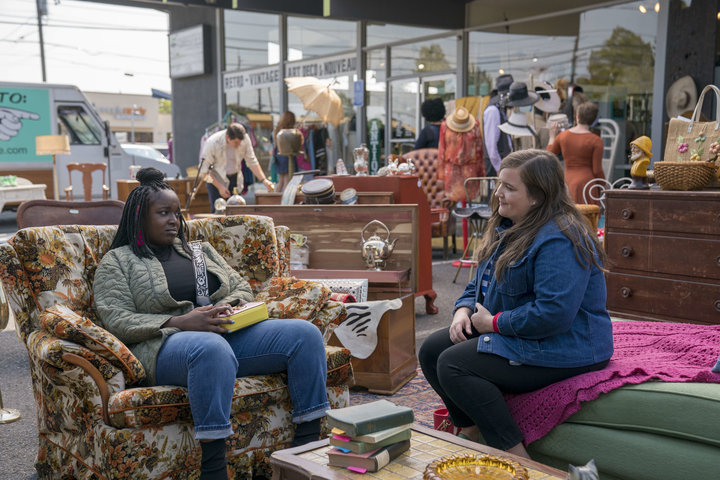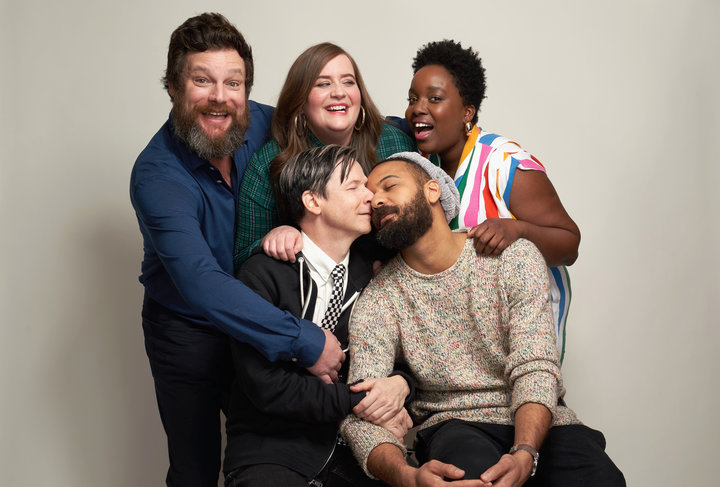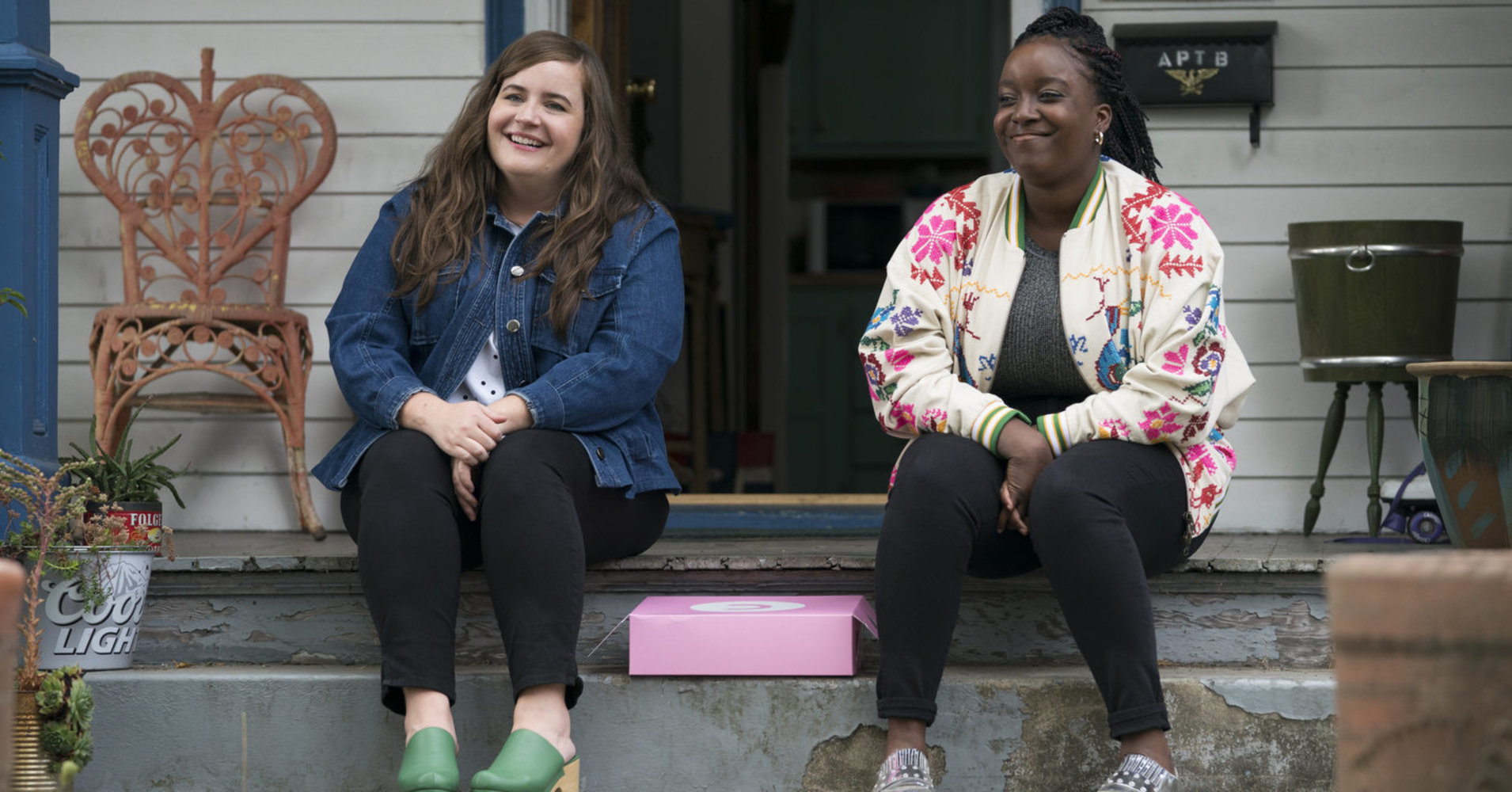[ad_1]
In the first episode of Hulu’s “Shrill,” the main character, Annie (Aidy Bryant), discovers she’s pregnant. She meets up with her best friend and roommate, Fran (Lolly Adefope), to talk through how it happened: The morning-after pill she’s been taking is only effective for people up to a certain weight, and she’s been lax about using condoms with the guy she’s seeing.
“Raw-dogging is literally his favorite thing,” Annie says, using a rather illustrative term for going sans prophylactics. “How could I take away his favorite thing?”
“My favorite thing is you not having a child with a guy who says ‘raw dog,’” Fran answers, completely deadpan.
It’s one of many excellent lines delivered by Fran, a gay hairdresser who lives with Annie in a charmingly decorated house in Portland, Oregon. (During taping, Bryant and Adefope would hang out in the house’s plant-filled “nook” between scenes.) In Adefope’s words, Fran is “confident and takes no shit.”
In your standard sitcom, Annie and Fran could have drawn as stereotypes: Annie unconfident and shrinking, Fran a brash, body-positive warrior. But “Shrill,” Hulu’s show inspired by Lindy West’s essay collection of the same name (West is an executive producer and co-writer on the show), presents the duo as nuanced and compelling — their bodies are an aspect of their identities, not the sum total.

At first, Fran shows little tolerance for the daily injustices Annie is willing to withstand, such as a personal trainer who confronts her and insists there’s a “small person inside dying to get out” or a non-boyfriend who asks her to leave through the back door to avoid detection by his roommates. Fran looks disdainfully at Annie’s diet food that’s pushed on her by her mother, telling her best friend it looks like a “stillborn puppy.”
Annie navigates the world this way as a natural response, it seems, to being told in so many ways that you’re too big: better to go with the flow, accept what you’re given, be easy if you can’t be some circumscribed ideal of a woman. Fran, also plus-sized, takes a different approach, choosing to be uncompromising and unapologetic — literally. “I don’t apologize to white people,” Fran, who is black, tells Annie’s love interest Ryan, shortly after mistaking him for an intruder and pepper-spraying him in the face.
But she is able to be sensitive to her friend’s insecurities, too — even if she doesn’t have them herself. When Annie fights back tears while explaining that she wasn’t strict about condoms because she didn’t know when she’d have the chance to be in a relationship or be a mother, “because of what I looked like, or … because there’s a certain way your body is supposed to be and I’m not that,” Fran eschews one of her characteristic too-cool, snarky responses, suggesting that Annie’s being too hard on herself and figuring out how to help.
“That’s, like, kind of the first moment where Fran is like, ‘Oh wow, I’ve never really seen this side of you where you’re so vulnerable,’” Adefope told HuffPost. “I like that, because it wasn’t like the stereotype of being like, ‘Love yourself, bitch. I love myself. Why don’t you love yourself?’ It was actually a sensitive look at a friendship where you might think you know everything about how a person feels, but actually people put fronts on all the time. Even with their closest friends.”
She added: “I like the fact that she’s more confident and can kind of inspire Annie in a way, but also not too confident that Annie’s like, ‘I’ll never be like that and we’re two different people.’ Just like, otherwise why would those two be friends?”
Adefope appreciates that the show isn’t trying to push some strident agenda. Rather, it’s honestly facing the truths of weight stigma and judgment (both from outside and from within) while presenting fat protagonists as what they are: real, relatable and multidimensional.
“The show is basically just being like, let people live their lives and don’t be rude to people … Like, mind your business basically, and let people get on with their own thing and look after their own bodies if they want to, rather than being like, ‘Everyone should be fat, and everyone should be fat all the time,’” Adefope said. “Like nobody’s pressuring anyone to do anything in the show. This woman’s just living her life and we just want to see her live a normal life.”

Adefope is making her mark stateside after establishing herself in the U.K. as a comedian and actor. Born in South London, she grew up loving Catherine Tate and Olivia Colman. She broke out after putting on a solo show at the Edinburgh Fringe Festival in 2015, where she performed characters of her own making.
“Whereas acting, you have to wait for someone else to give you the opportunity to do it, in comedy, you can just pick out your own strengths and be like, I’m just going to show the best bits to the world,” she said.
“All my characters are like, weird people. Weird, un-self aware people,” Adefope said. One of her characters, for example, is a political correctness guru who actually turns out to be super offensive. “He completely thinks that he’s really woke and knows the right terminology to use, but actually is just a very weird guy.”
Adefope found an agent through her work at Edinburgh and began picking up roles in series like Netflix’s “Sick Note” as well as a part in the Mila Kunis action comedy “The Spy Who Dumped Me” in 2018. This year is already starting out as a banner one for Adefope’s career with her role as Fran and as Rosie in TBS’ “Miracle Workers,” where she plays a jaded executive assistant to God.
The full first season of “Shrill” drops on Hulu March 15.
Adefope hopes that audiences will watch the show without attaching a strict message to it and “just take it for what it is.”
“I hope that people take from the show that it’s … about living your own life and not expecting anything from anyone, and not expecting people to change for you,” she said. “So fingers crossed for all that.”
[ad_2]
Source link

